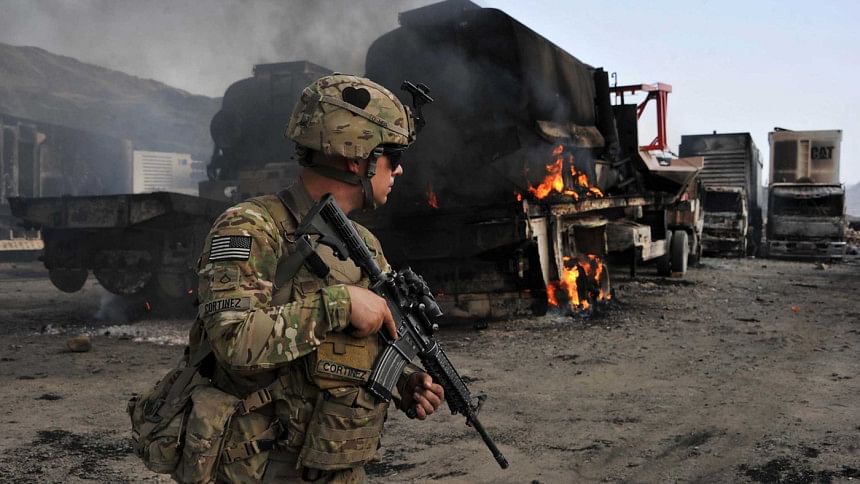How the US’ War on Terror played out on its social divide

Where have all the flowers gone?
The girls have picked them every one.
Oh, When will you ever learn?
Oh, When will you ever learn?
…
Young men
They're all in uniform.
Soldiers
They've gone to graveyards every one.
Graveyards
They're covered with flowers every one.
—"Where Have All the Flowers Gone"
Song written by Peter Seeger
On June 23, 2010, a rocket-propelled grenade shattered the skull of US Army Private First Class Russell Madden in Afghanistan, where he was fighting his country's war against terror. He came from a poor Kentucky neighbourhood, his son was born with cystic fibrosis, and he had no insurance. He had gone to the army only to pay for his son's medical expenses. His mother, wife, and son have since been bearing the burden of the US's Global War on Terror. With this sad story, the University of California Professor David Vine starts his book "The United States of War."
But for some, the same war has been immensely beneficial.
While Madden's wife and mother were grieving, the US defence contractors saw their profits soaring. Boeing, Raytheon, Lockheed Martin, Northrop Grumman, and General Dynamics—the top five—saw their share prices increase tenfold in 20 years, since President George W Bush launched the War on Terror in September 2001. It is almost twice the average gain of the Standard and Poor's 500 (S&P 500) Index Fund during the same period. The unprecedented war in Afghanistan, Iraq, Syria, and Libya has played out quite well to fill up the coffers of the world's most influential corporates. A symbiotic relationship between these corporates and the government policymakers has instigated wars in far-flung countries to make such profiteering possible. Let's look into some instances to elaborate on this point.
Major General (retd) Mike Boera had once been the US Air Force's director of programmes and requirements; he developed programmes and business plans for weapon systems. After retirement, he joined Raytheon as the executive of intelligence, information, and services. Within a year, the company received approximately USD 2.9 billion in air force contracts. Incidents such as this are aplenty, as a 2018 study by the Project on Government Oversight (POGO)—an independent watchdog—elaborates. Termed "the revolving door," such moves from the Pentagon to the corporates benefit the wider defence industry.
US-based global defence and aerospace contractor BAE Systems, Inc had Gerard "Jerry" DeMuro as its CEO from 2014 to 2020. DeMuro had previously worked as an acquisition official at the US Department of Defense (DOD) for almost a decade. Before joining BAE, DeMuro had served two other defence contractors: GTE Government Systems and General Dynamics. President Barack Obama recruited an industry lobbyist as his first deputy secretary of defence—an example of the reverse-revolving door.
Many private military and security contractors (PMSC) have also greatly benefitted from the wars. The collapse of the former Soviet Union in 1991 and the Battle of Mogadishu in 1993—where 18 American rangers were killed—made sending troops to distant places difficult to justify to the voting public. The use of contractors provided a way to avoid public scrutiny and congressional oversight. The war efforts eventually became so contractor-dependent that in 2020, the PMSCs deployed 27,388 personnel compared to only around 5,900 troops in Iraq, Syria, and Afghanistan ("Congressional Report: Department of Defense Contractor and Troop Levels in Afghanistan and Iraq: 2007-2020," updated February 22, 2021). The Blackwater (later renamed Academi) incident sheds some light on the PMSCs' influence on the US government. In 2007, four of its employees killed 17 Iraqi civilians at Nisour Square in Baghdad. All four were found guilty by a federal district court. However, President Donald Trump pardoned them in December 2020, just before leaving office.
Then there are the oil giants. While the Iraq war was not necessarily only about oil, the oil industry played a crucial role. On April 15, 2013, CNN ran a story titled "Why the war in Iraq was fought for Big Oil," elaborating on how the big oil companies profited from the Iraq war. During the rule of Saddam Hossain, Iraq's domestic oil industry was under government control and closed to Western oil companies. After his fall, oil giants such as ExxonMobil, Chevron, BP, Shell, and Haliburton secured most of the industry.
Brown University estimates the enormous cost of the War on Terror under its "Cost of War" project. Many columnists have quoted it to say the total cost was USD 8 trillion. Had it not been for the war, how could it have benefitted the US public? The National Priorities Project, a federal budget research organisation, provides an idea. As a rough estimate, USD 5 trillion could have paid for 18 years of healthcare for the 13 million poor US children, two years of their schooling, four-year public college scholarships for 28 million students, 20 years of healthcare for one million military veterans, and four million clean energy jobs—all at the same time. All of these were foregone to satisfy the big corporates' insatiable hunger for profit.
The nature of today's war is such that there is no definite end, nor are there any clear victors or vanquished. It has been amply demonstrated in Afghanistan, Iraq, Libya, Syria, and elsewhere. While the war rages on, men and women such as Russell Madden and their families lose. Russell was just one of more than 7,000 who died in all these inconclusive wars. Then there are 1.7 million veterans who had reported disability due to wartime deployments until 2018.
It's pretty tempting to say that the US has failed to achieve its mission in Afghanistan. But what was the mission's objective? Whose mission was it? Have all in the US lost? If not, who has won? Perhaps we can be sure about only one thing: the withdrawal from Afghanistan marks the end of one chapter of the extended global war. And a new one has already begun.
Dr Sayeed Ahmed is a consulting engineer and the CEO at Bayside Analytix, a tech-focused strategy consulting organisation. His Twitter handle is @sayeed_ahmed2

 For all latest news, follow The Daily Star's Google News channel.
For all latest news, follow The Daily Star's Google News channel. 



Comments